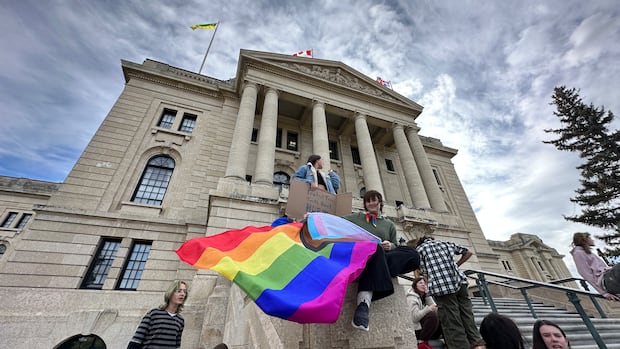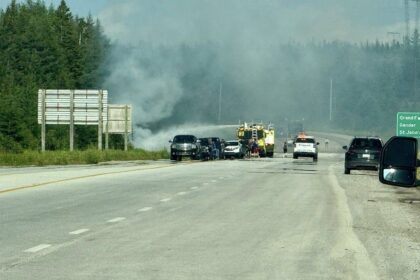SaskatchewanNo date has been set for the court to hear the cross appeals from the provincial government and UR Pride on the province’s school pronoun law, which prevents children under 16 from changing their names or pronouns at school without parental consent.Law prevents children under 16 from changing their names or pronouns at school without parental consentThe Canadian Press · Posted: Nov 06, 2025 10:21 AM EST | Last Updated: 1 hour agoListen to this articleEstimated 3 minutesThe audio version of this article is generated by text-to-speech, a technology based on artificial intelligence.Saskatchewan’s school pronoun law prevents children under 16 from changing their names or pronouns at school without parental consent. (Kirk Fraser/CBC)The Supreme Court of Canada says it will hear appeals in a challenge of Saskatchewan’s school pronoun law.No date has been set for the court to hear the cross appeals from the provincial government and UR Pride, an 2SLGBTQ+ group in Regina. The law prevents children under 16 from changing their names or pronouns at school without parental consent.Premier Scott Moe’s Saskatchewan Party government introduced it as a policy in 2023, arguing parents should be involved in decisions their children make at school.Lawyers for UR Pride challenged the rule in court, arguing it violates Charter rights and causes irreparable harm to gender diverse youth.A judge granted an injunction to halt the policy. But a month later, the province put it into law and invoked the notwithstanding clause, allowing it to override certain Charter rights for five years.The province argued the challenge should be thrown out because it invoked the clause, but Saskatchewan’s Court of Appeal ruled earlier this year it can continue.It said the court can’t strike down the legislation because of the notwithstanding clause, but it can issue a declaratory judgment on whether the law violates constitutional rights.It also ruled UR Pride can still argue the law be struck down, because the clause wasn’t applied to Section 12 of the Charter — the right to be free from cruel and unusual treatment. The province cited other sections when it invoked the clause.The group and the province both appealed and asked Canada’s highest court to expedite the case to be heard alongside a challenge of a Quebec law that prevents public sector workers from wearing religious symbols on the job.Quebec also invoked the notwithstanding clause in its law.The case in Alberta A similar legal battle is brewing in Alberta.Premier Danielle Smith’s government invoked the notwithstanding clause last week to shut down a provincewide teachers strike and shield its back-to-work bill from legal challenge.Also in Alberta, a government memo obtained by The Canadian Press in September indicates Smith’s government plans to use the notwithstanding clause in three pieces of legislation policing school pronouns, female sports and gender-affirming health care.Those laws have already passed but face challenges.Part of the law banning doctors from providing gender-affirming health care to those under 16 is on hold. A judge ordered a temporary injunction earlier this year, but Alberta is fighting that ruling, arguing it was premature.Another bill requires youth to get parental consent to use different names or pronouns at school, and a third bans transgender girls from amateur female sports.Smith has said publicly no decision has been made on whether to invoke the notwithstanding clause but adds her government may have to because it could take years for courts to resolve the issue.
Supreme Court will hear appeals of Saskatchewan’s school pronoun law











